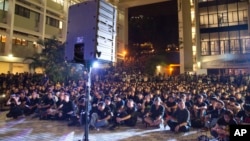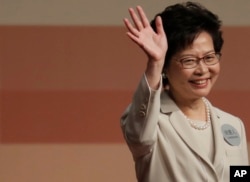Hong Kong scientists and researchers who apply for state grants must show they “love the country and Hong Kong,” a directive that concerns academics here who fear the nation wants to subject scholars to a patriotic test.
Earlier this month [May], Chinese President Xi Jinping proposed to strengthen Hong Kong’s science and technology research by letting Hong Kong scholars seek state grants, a first since Britain returned the territory to China in 1997. But the official Xinhua news agency, a state news outlet, said applicants must show love for the country and the territory.
Several Hong Kong scholars and academics blasted that announcement as a test of patriotism. Carrie Lam, the city’s chief executive, said people had misinterpreted the Chinese state guidance.
“Of course, in Hong Kong we do expect, whether you are a scientist or researcher, or government official like myself, to love our country and love Hong Kong,” Lam told reporters earlier this month. “So that is nothing unusual. I think, some commentators have read too much into this term.”
But some academics fear the impact of any grant requirement could tamper with scholarship.
“We hold the view that if the highly ambiguous and fickle term of “love the country and Hong Kong” will become a prerequisite for local scientists to apply for the proposed grant, it can establish a very dangerous precedent highly detrimental to our freedom in general and academic freedom,” reads the petition started by 23 individuals and academic groups. They worried that such orders would spread to the humanities, social sciences, and law, in a city that has a separate constitution with greater freedoms than mainland China.
By Monday, some scholars said they still were not clear if evidence of state loyalty was mandatory. “It’s still ambiguous whether it will be a compulsory requirement,’’ said Ming Sing, a sociology professor at Hong Kong University of Science and Technology who helped to start the petition. “We have great worry if nothing is done there is a possibility for it to become a requirement.”
The announcement came as the special administrative region of China is working on a bill, under Beijing’s orders, that Hong Kong residents honor China’s national anthem. Many democracy advocates here bristle at the requirements that they must solemnly value the Communist song, “The March of the Volunteers.”
The scholars point out that there have been other attempts by Beijing to instill patriotism in Hong Kong. One recent example came in 2012, with a proposed schools curriculum designed to foster positive feelings about the nation. More than 100,000 protesters to the streets, skewering the plan as brainwashing. Soon after, the Hong Kong government shelved the idea for a mandatory rollout.
More than 20 Hong Kong laboratories and research centers have received national money, part of Xi’s effort to support Lam’s goal to make Hong Kong a world innovation hub, according to government reports.
Microbiologist Chen Honglin at the University of Hong Kong said Chinese state money would help his lab pay for more researchers as they scramble to find a flu vaccine for Hong Kong, where thousands were sickened last winter. Most Hong Kong research relies on local government funding, and there’s not enough of it. He was able to get $1 million HK ($127,467 US) for three years, not nearly enough to employ 10 people and cover lab costs.
“If there is another possibility for funding from mainland China, everyone is happy with that,” said Chen. Born on the mainland, he said he had not heard about any need to prove his patriotism. As far as he’s concerned, the winners will succeed because of the quality of their ideas.













